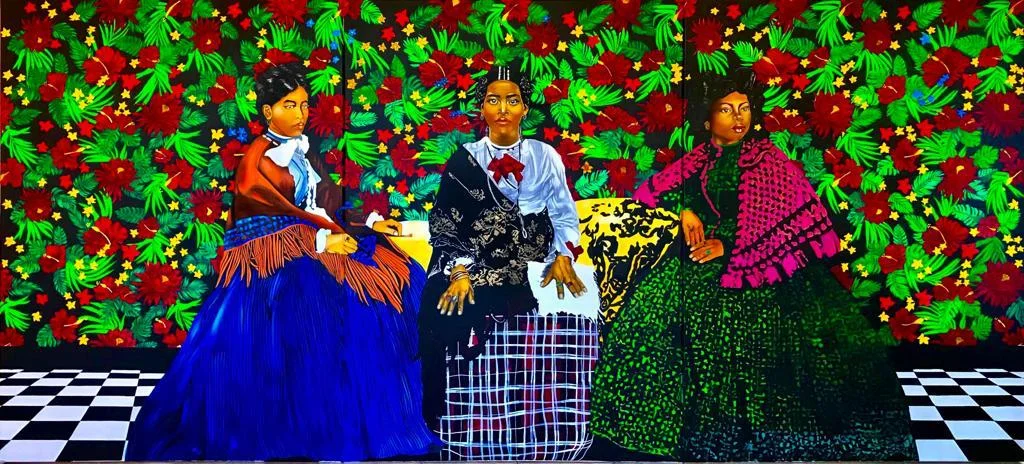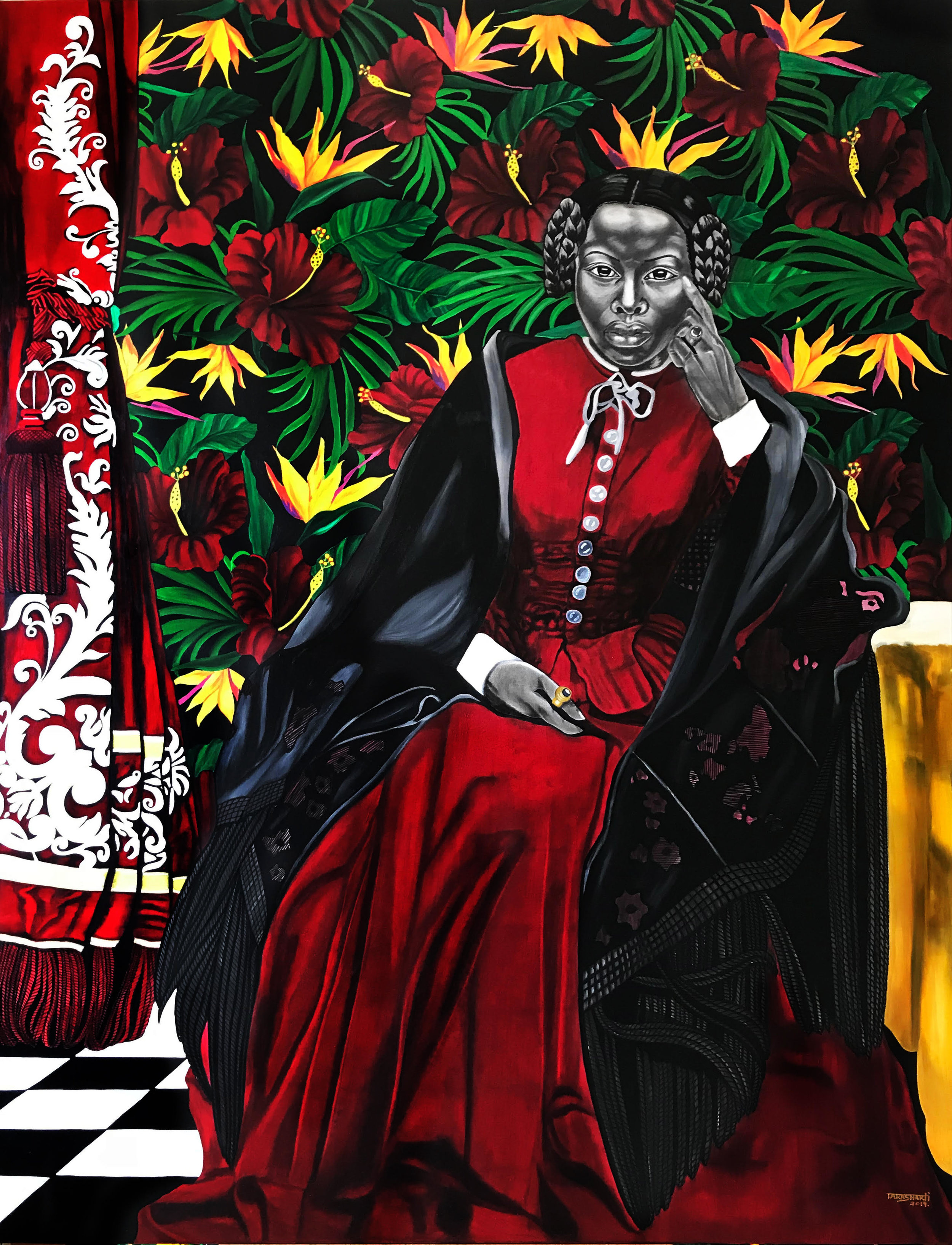PHOTOGRAPHY 2019 WINNER
ARTS & PHOTOGRAPHY
Gene Avakyan and Victoria Unikel
PAINTING WINNER 2019
ARTS & PHOTOGRAPHY
Tara Shakti
Madagascar
Miora is ten-years-old and frightening about what is going to happen to her. She will be leaving her small three-room home she shares with her parents and sisters.
The family has little, and most days her stomach growls with missed meals. She would like to attend school, but there is no extra money for the school fees let alone the books and pencils that would make attendance possible. She will leave the small comfort of her sisters’ smiles and her mother’s embrace to go begin domestic work in a nearby town to help support her family. She doesn’t see it, but today is the day invisible chains forged from poverty, racism and patriarchy are shackled to her.
If she is lucky, the job will be as the recruiter said it would be, domestic hard labor keeping a wealthier family’s household clean and in order day after backbreaking day. Even then, she may be subject to abuse for there is no shelter for her. She will have no place to go, no where to seek help.
That is if she is lucky. For the unlucky, the lure of domestic work is a mere lie which hides the darkness of human trafficking and sexual slavery. Miora could find herself at the hands of men who have far more gruesome and soul destroying plans for her. For young girls like Miora, it is a cycle of abuse and horror that has continued for generations in Madagascar.
It is for these young girls and the women they become that I created my series “Archives.” To bring a light to the past tragedies that continue to this day and to honor the unbreakable spirit of the women of Madagascar who suffer the invisible chains that the world choses far too often not to see. Hunger, horror and desperation are the companions of too many of the children of Madagascar. Born into a world where food is never a given, shelter a hope, and poverty a darkness which envelopes their world. The children of Madagascar are too easy prey for the monsters waiting for them almost since birth. Born into families desperately poor in rural areas of the country, their families have little options in terms of employment and school for their children an extravagance. Children as young as five find their options limited too begging or forced labor.
The lingering effects of Madagascar’s caste system and the deeply rooted discrimination resulting from it, continued to marginalize the most vulnerable people in society, particularly those descended from slaves. As a result, the children, who are frequently undernourished and suffer from chronic hunger, are doled out across the countryside as domestic workers in order to pay off rising debts or simply to help feed the family
Despite prohibitions in the Penal Code, child sexual exploitation by tourist continues to exist in the coastal cities of Toamasina, Toliara, Antsiranana, Nosy Be, Mahajanga, and Fort-Dauphin.Child prostitution is prevalent, particularly around the formal and informal mining sites of Toamasina and Illakaka, respectively. Malagasy men are the main clients of prostituted children, while most child sex tourists are French and Italian nationals, with some reports of sexual exploitation of children by other Western nationals and Comorans. Government officials are allegedly complicit in obtaining falsified national identity cards, which facilitates the sexual exploitation of children for commercial sex in Madagascar and the domestic servitude of Malagasy women abroad. The women of Madagascar have invisible chains forged under the guise of work abroad. Malagasy women continue to be sent to China with falsified identity cards and exploited in forced labor and sold as brides. According to an International Labour Organization Issue brief, many women in Madagascar seek employment as domestic workers in Middle Eastern countries. The majority is mostly rural, illiterate single mothers pursuing employment opportunities in Lebanon and Kuwait for lack of better options in Madagascar. There are a number of recruitment agencies located throughout the country and the Madagascar Ministry of Labor and Civil Service is responsible for regulating these agencies and approving the immigration of each worker. An estimated 4,000 Malagasy women are employed as domestic workers in Lebanon and an estimated 3,000 are employed in Kuwait. Saudi Arabia, Jordan, Mauritius and Seychelles are also destinations for domestic workers.
There has been an official ban on sending women to Lebanon since November 2009, however women continue to go. In response to complaints from domestic workers, a one-month ban on sending workers to certain countries was implemented in early 2013. Reports of abuse are common and a number of trafficking victims returning from Lebanon, Kuwait, and Saudi Arabia have reported that they were subjected to physical and psychological abuse, harsh working conditions, confinement to the home, confiscation of travel documents, and withholding of salaries, which are all indicators of forced labour, according to the US State Department reports.
Many of the women migrating are illiterate single mothers from rural areas and vulnerable to deception and abuse by recruitment agencies and employers. And worse, the human trafficking for forced labour is not even the worse fate for these women. The current legal age for marriage in Madagascar is 18 years, but despite this girls and boys as young as 10 years old continue to be in situations of servile marriage—forced to marry against their will—throughout the country. Servile marriage is often linked to various forms of forced labour, including domestic servitude and can also constitute slavery. UNICEF reported in 2007 that between 1987 and 2005, 39% of Malagasy children were married before the age of 18.
According to the UN Special Rapporteur on contemporary forms of slavery, Gulnara Shahinian stated, following a visit to Madagascar in ......“Victims of such arrangements are likely to be also victims of domestic servitude and sexual slavery. They are equally denied their right to health, education, non-discrimination and freedom from physical psychological and sexual violence” Through the series “Archives” I have tried to capture the nobility and strength of the Malgasy women who suffer in human bondage, fighting each moment of each day for their souls. My brush and paint a chronicle of this attempt to crush the human soul but these women unrelenting holding on to the divine spark within them.
I try to honor the hopes, the dreams and the freedom they longed for in their depictions. Their strength added to others in the hopes of finally breaking these women from these invisible chains that bind not just them but the souls of all who watch it happen.
Most art depicting slavery present the physical chains of bondage. In this series I wanted the audience to feel the invisible psychological chains that bind these women. In their faces, I wanted the audience to feel their dignity. A dignity still intact despite the incredible trauma they have endured from the darkest demons of humanity. And lastly, they sit waiting. Waiting for the world to recognize the inhumanity that afflicts them and poisons the soul of the world. They will stand with us when we change and prevent another cycle of bondage and break the invisible chains holding world from ascended to a better place.




